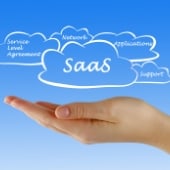 The IT sector relentlessly comes up with new business solutions that cut costs and increase efficiency. One such innovation is Software-as-a-Service (SaaS). In this post, you’ll learn more about what SaaS is — and why you shouldn’t miss out on it.
The IT sector relentlessly comes up with new business solutions that cut costs and increase efficiency. One such innovation is Software-as-a-Service (SaaS). In this post, you’ll learn more about what SaaS is — and why you shouldn’t miss out on it.
What is SaaS, and what does Software-as-a-Service even mean?
Just a few years ago, the main way for computer users to get software was to either buy a physical CD or download the software from the internet. The software needed to be installed in users’ machines, which meant that those machines had to have sufficient storage space and processing power for the software to work. Moreover, the license to use the software copy is usually limited to one machine. Therefore, the user had to buy another copy of the software if they wanted to install the software on another machine.
In business settings, software delivery was streamlined so that on-premises (on-prem) servers held the software programs, and users accessed these programs via the company’s intranet. The user’s own device became a medium for entering input and displaying output, but most, if not all, of the processing was done by the on-prem servers. In this setup, economically priced license packages allowed a single software copy to be used by tens or hundreds of users at a time.
Today, SaaS essentially allows users to go online, “borrow” the machines of a service provider, and use the software applications installed on those machines. Since the user only has to access the internet to access SaaS apps, they can use portable devices like laptops and smartphones and use the software wherever there is internet connectivity. This gives users more flexibility since they don’t have to go to the office to work.
Should I stick to on-prem IT infrastructure or switch to SaaS?
SaaS is an ideal solution for businesses that want to reduce upfront costs. With on-prem software, you first need to buy on-prem hardware, which you will then need to maintain. Next, you need to purchase a software license and pay yearly support fees, which can amount to 22% of the license fees (ouch!).
With SaaS, you don’t need to buy your own servers to host the actual software. Moreover, you pay only a monthly or annual subscription fee that covers licenses, support, and other fees. This lets you spread out costs, which is more manageable than buying expensive lifetime licenses and paying huge maintenance bills annually.
How flexible is SaaS? Will it be able to fulfill the particular needs of my business?
Traditional on-prem solutions used to have two advantages over SaaS: the former granted more functionality and allowed full customization. However, SaaS vendors now continually introduce more and more features that users ask for. Moreover, businesses can often integrate SaaS apps with other apps to suit their needs. That is, if one app is missing a particular feature, it can be integrated with another app that has that needed feature.
How safe will my data be?
Organizations often cite data security concerns as reasons for not adopting SaaS. Will the company’s data be safe? Who will own such data? What if the SaaS vendor’s business goes kaput?
These are all valid concerns. But you should know that the average SaaS vendor invests more in cybersecurity, backup tech, and maintenance than the typical small- or medium-sized business. This is the vendor’s line of business, and they can’t afford to lose their clients’ trust. Moreover, they’re subjected to strict security audits, especially those that are covered by data regulations like HIPAA.
Additionally, when your organization takes on a SaaS vendor, both parties sign a service level agreement (SLA). This SLA has clauses specifying who owns the data inputted into a program and the output produced by the program, and the vendor’s obligation to grant you access to your data even if they suffer economic setbacks or business failures.
For more information on SaaS, send us a message today. We’ll help you determine if utilizing SaaS is best for your business.

You must be logged in to post a comment.